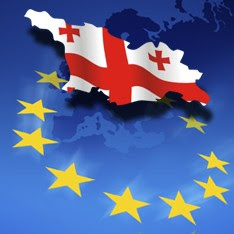During the 29 November Eastern Partnership Summit, the EU - Georgia Association Agreement was initialled. The Association Agreement, including the Deep and Comprehensive Free Trade Area, will further strengthen political, economic and trade relations between the parties.
On the occasion of the November 2013 Eastern Partnership Summit in Vilnius, the High Representative for the Union for Foreign Affairs and Security Policy Catherine Ashton, Commissioner for Trade Karel De Gucht and their Georgian counterparts initialled an Association Agreement in order to further strengthen relations and cooperation between the EU and Georgia and their citizens. The initialling of the Agreement is an important step towards its eventual signature and subsequent implementation by all EU Member States and Georgia.
Although the Association Agreement has not yet been signed, the EU is committed to sharing exactly what it contains.
The Association Agreement is a concrete way to take advantage of the very positive dynamics in EU-Georgia relations. It focuses on support for core reforms, economic recovery, governance, sectoral cooperation and the far-reaching liberalisation of Georgia's trade with the EU.
THE ASSOCIATION AGREEMENT IN A NUTSHELL
What are the objectives of the Association Agreement?
The Association Agreement aims to deepen political and economic relations between Georgia and the EU, and to gradually integrate Georgia into the EU Internal Market. It includes the creation of a Deep and Comprehensive Free Trade Area (DCFTA),which is a core part of the Agreement.
What are the main areas of cooperation?
Core reforms: reforms are foreseen in a number of key areas, including security policy, economic recovery and growth, governance and sector cooperation in areas such as energy, transport, environmental protection, industrial cooperation, social development and protection, equal rights, consumer protection education, and youth and cultural cooperation.
Values: The Agreement places great emphasis on democracy and the rule of law, human rights and fundamental freedoms, good governance, a market economy and sustainable development.
Trade: The Agreement will offer Georgia a framework for enhancing its trade and for economic growth by the removal of customs tariffs and quotas, and by a comprehensive approximation of laws, norms and regulations in various trade-related sectors. This will facilitate Georgia's progressive integration with the EU economy.
How will citizens benefit from the Association Agreement?
Once signed and implemented, concrete benefits can flow from the Agreement. Examples include the better protection of consumers through the higher quality and improved safety of locally-grown agricultural products; better business opportunities for small- and medium-sized enterprises through the opening of markets; better access to improved health services; and energy savings thanks to more efficient use of energy resources and the development of renewable energy sources; a better functioning judiciary and thanks to the strengthened rule of law, demanding accountability rules for public decision-makers and increased transparency.
News
December 13, 2023
Ethnic minorities outside the peace dialogue
November 6, 2023
‘Peace’ agenda of political parties
Popular
Articles
February 13, 2024




